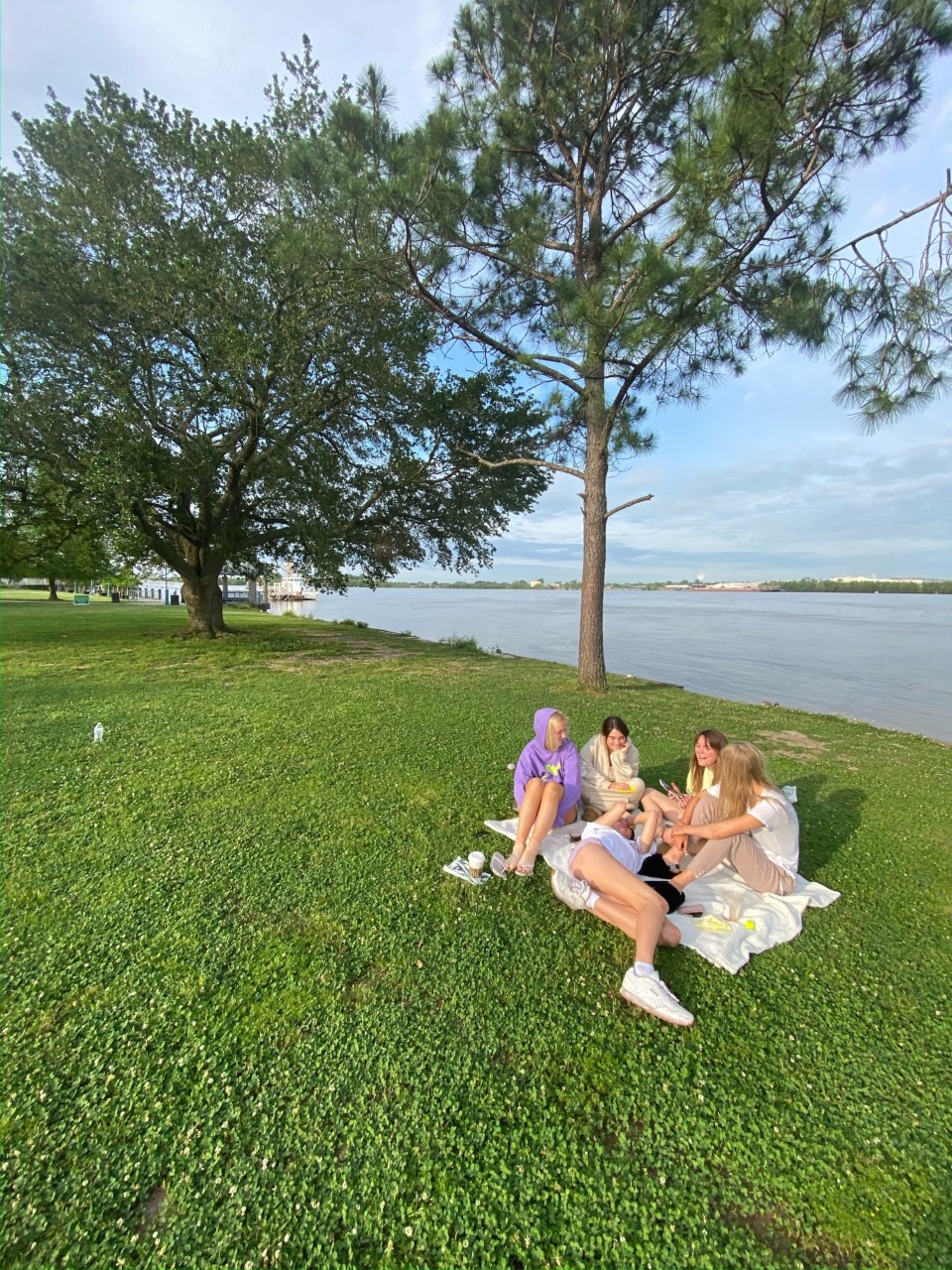
The Fly (Photo by Ryan Rainbolt)
As I am stressing out from my hefty eighteen hour class schedule and the hours upon hours of homework that come with it, the multitude of social and administrational obligations from my office in my sorority, and just being a regular college student on top of it , I walk a little faster down Broadway. I find myself on the other side of Saint Charles, where there are no loud fraternity houses with boys blasting EDM music at the ripe hour of 11:30am or students lounging on seemingly indoor couches on their outdoor porches. As I walk down further, I start to see the train tracks on top of a grassy hill at the T junction of Broadway Street and Leake Avenue. As I cross, the banks of the Mississippi River seem to be 30 feet away, but are actually around .4 of a mile away, with cargo ships passing ideally by.
I’ve arrived at the Fly, as it is referred to by locals and college students alike. The actual name is the Audubon Riverview Park, for its location of being tucked in behind the Audubon Zoo and being included in the blanket of Audubon department. All of the Audubon property is owned by the public but run by a private institution called The Audubon Nature Institute, this includes the parks, aquarium, and museums. The nickname “the Fly” originates from a “short-lived” butterfly-shaped building, opened in 1969, that held a concession stand and restrooms. The intention of the shape was never supposed to be a butterfly, but rather a “seagull perched on the bank of the Mississippi River”. The people who frequented the area preferred to see it as more of a butterfly-shaped building and by 1983, it was mainly being referred to as “The Butterfly”, which later evolved to just “The Fly”. Known for being a great spot to relax and take a breath of fresh air among the constant movement of the outside world, the Fly is home to a clearing by the river that is great for picnics and spending time outside, as well as recreation soccer and baseball fields that have frequent little league games going on.
For Tulane students, the Fly has become a tradition for every Friday afternoon, when classes are over and the weekend begins, where friends will bring picnic blankets and drinks to enjoy the sunset together. One of the most notable parts of this tradition is an influx of photos put on Instagram at the Fly with captions along the lines of “Freaky Fly Day!”, referring to a popular 2000s Disney remake of “Freaky Friday”. Honestly, they have no correlation other than the play on words. This tradition is not something you would only discover when you attend the university, it is frequently brought up on tours of the campus for prospective students. Tour guides never fail to mention the coming together of all students, no matter which social organizations or other group organizations you may be a part of, every Friday. It has become one of the main selling points for the school, along with the clear popularity of Mardi Gras and other festivals around New Orleans. They explain that is a great way to be in touch with the social and emotional community that Tulane prides itself on. It has been marketed as a great way to meet new people you would not have known otherwise because of the large range of Tulane students who partake in this tradition. Colleges and Universities all over the United States have used these fun student-made traditions to convince students to attend their school for generations. Danielle M. Spoutz from Taylor University released a thesis on how college traditions impact a university’s culture. In her findings, she states that college traditions enrich the culture on campus by conveying the values and beliefs of the university. Applying this to Tulane’s tradition of the Fly, this tradition brings the value of community to life on campus. Tulane has always advertised the school as a medium sized school with a small school feel, the tradition of Fly Day really shows how that is true with all different kinds of students coming together for just one evening a week. Spoutz brings in a point of how tradition links the ones currently attending the university to those who have in the past. There is no way to pinpoint when the tradition of Fly Day originally started, it just has always been something that Tulane students do. The seniors have gone since they were first years, along with the seniors before them and the seniors before them.

Tulane Students Enjoying The Fly (Photo by Ryan Rainbolt)
In my own experience at the Fly, I will go with a group of friends and bring a speaker, a blanket, and a cooler so we can enjoy the sunset with the rest of the students partaking in Fly Day. Tulane’s student run magazine, The Crescent Magazine, provides a sort of checklist of “Flyday Friday Necessities” to help students who are new to the tradition bring what they need to have the best experience. The sense of community I feel during these Friday evenings relates directly to Spoutz’s research on traditions bringing the value of a community on campus, even if the tradition is not taking place immediately on the university’s campus. Since the Fly is made up of a large clearing by the Mississippi River, students and residents alike have created an atmosphere of outdoor activity, such as drinking games on a table someone brought (beer pong, beer die, or flip cup), even bringing a speaker and microphone for some “outdoor karaoke” (which I, surprisingly, have seen multiple times) or just having a photoshoot to post the traditional Fly Day pictures on Instagram. For the outdoor drinking games, I’ve noticed beer pong seems to be the most popular during Fly Day. Unsurprisingly, beer pong originated from fraternity guys, at Dartmouth University in the late 1950s. They came up with this classic drinking game when they noticed the red solo cups on the tables could serve as targets and they started by using ping pong paddles to hit the ping pong ball into the cup. It is unknown when the use of the paddle ended, it is believed to just have evolved over time.
One of the best parts of Fly Day, that students have noted, is the fact that it is a great way to spend some time outdoors. Campus culture is a lot of spending hours in the library or any study space you can find and having a chance to get out and enjoy nature. Many traditions entail being outdoors and enjoying nature, similar to how many Pagan rituals involve “observing the nature cycles” and some involve sharing a feast of food and drink after offering some to their respective gods or ancestors. Although Fly Day is not a Pagan ritual of celebrating our gods, deities, or ancestors (some groups may do this but it is generally not a part of the tradition), it has become our own form of ritual with the time outdoors as a Tulane community and, usually, enjoying food and drink in a more picnic setting.
 NOLAbeings Multimedia artist Claire Bangser created NOLAbeings as a portrait-based story project that marries...
NOLAbeings Multimedia artist Claire Bangser created NOLAbeings as a portrait-based story project that marries...  Voodoo in New Orleans: Reviving history: New Orleans fortune telling This article takes a deep dive into the history of Voodoo in New Orleans, its hybridization with Catholicism, and its present-day place in the city's culture. The author visits fortune-tellers in the French Quarter, using their guidance as a tool for introspection rather than a deterministic predictor of the future. Through her experiences in New Orleans, the author feels a mystical connection to both the past and the future.
Voodoo in New Orleans: Reviving history: New Orleans fortune telling This article takes a deep dive into the history of Voodoo in New Orleans, its hybridization with Catholicism, and its present-day place in the city's culture. The author visits fortune-tellers in the French Quarter, using their guidance as a tool for introspection rather than a deterministic predictor of the future. Through her experiences in New Orleans, the author feels a mystical connection to both the past and the future. 